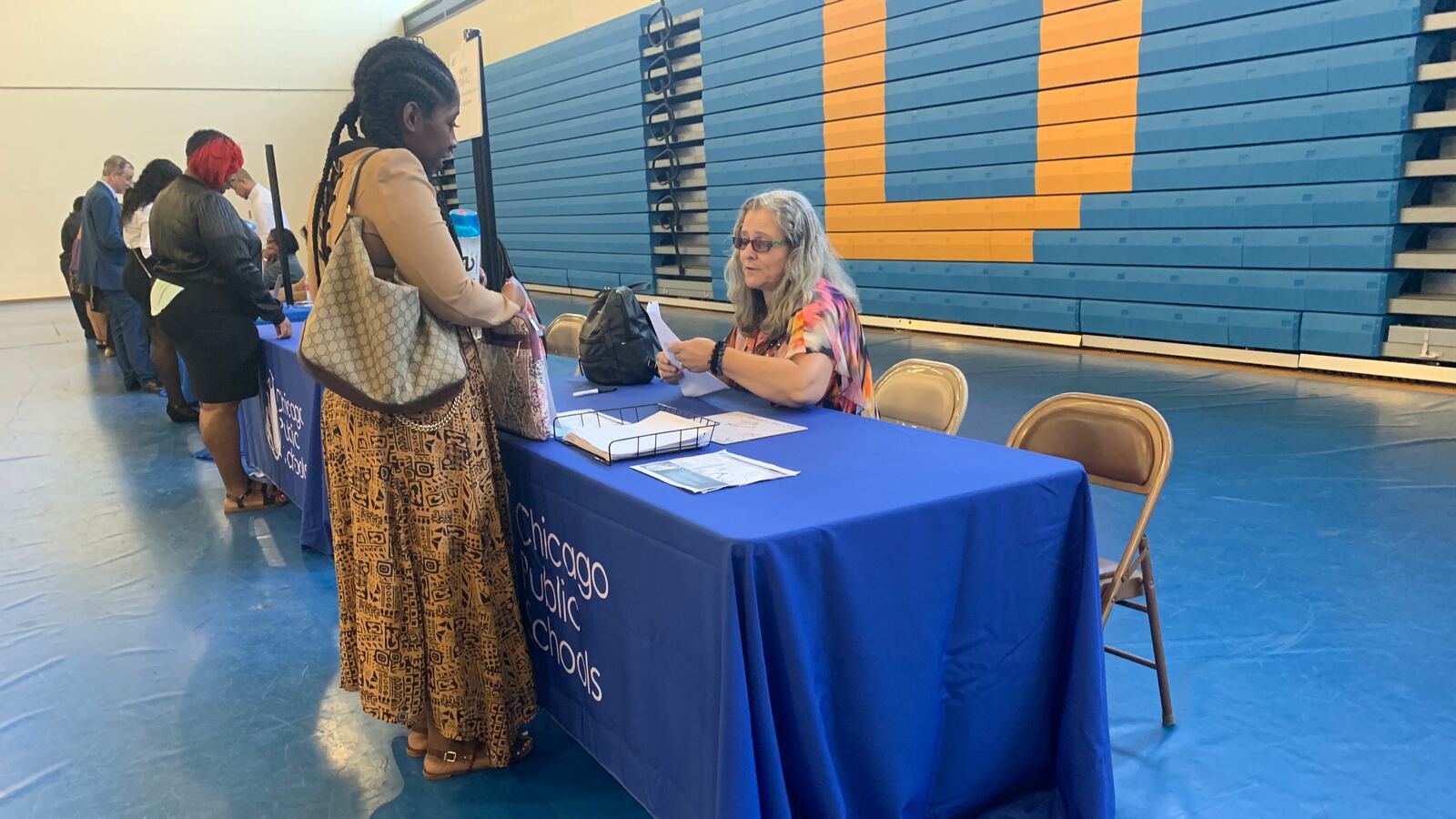Last school year, Alondra Avalos was laid off at two Chicago elementary schools as a special education assistant, but this summer she is printing out her resume, putting on her black blazer, and getting back into the game.
As of Monday, Chicago Public Schools reported 1,450 teaching vacancies and 600 non-teaching vacancies, though a spokeswoman for the district said the numbers change every day, as schools are hiring. Hoping to snag one of those open positions, Avalos attended a district job fair last week alongside about 600 other job seekers, who paraded through the gymnasium at Richard J. Daley College on the city’s Southwest Side, resumes in hand.
As neighborhood demographics change and school district enrollment declines, Chicago has sought to right-size its education workforce with layoffs in the spring and rehires before school starts. Last spring, the district laid off nearly 500 paraprofessionals, clerks, and other support staff but pledged to rehire many of them for other schools.
Last school year, 65% of the people laid off the previous spring found other positions. Avalos was one of them, and she’s hoping the odds this year again will be in her favor.
Inside the fair, tables organized by job type advertised many of the crucial positions that support teaching and learning, including special education classroom assistants like Avalos, security guards, and lunchroom workers, all of whom earn from $15,000 to $40,000 a year, according to district salary files.
As part of her pitch to snag the special education job, Avalos noted the need for experienced aides.
“Some of these kids need some extra attention, more than someone just going through the motions,” she said.
Avalos and other laid-off workers are competing with newcomers who see positions like special education aides, early education teachers, and security guards as points of entry to Chicago Public Schools — and possibly leading later to better-paying jobs. For example, Chicago draws from its pool of teachers assistants and aides to build out a residency program that subsidizes the partial cost of a college degree in exchange for working in hard-to-staff schools.
“I want to stay in CPS and move up,” Avalos said, when asked about her future goals. “I love working with kids.”
Tamica Pratt had one word to describe what she was seeking at Chicago Public Schools: stability. She handed in her resume to apply for the special education classroom assistant, teaching assistant, and early education jobs. She said in a larger district like Chicago, she would have opportunities to change student lives as her teachers did for her.
“We don’t give our teachers enough credit, nor do we pay them enough,” Pratt said. “They’re expected to teach, they’re expected to be a counselor, they’re expected to be a parent, all in eight hours.”
Avalos also wants a stable position for September. But even if she gets one of the jobs she’s seeking, she’s not guaranteed stability. A week ago, the union representing many support workers in Chicago schools, including special education assistants, voted overwhelmingly to authorize a strike if contract negotiations falter in the fall.
Two hours into last week’s fair, the line from the gym snaked into the hallway and around the corner. Inside, candidates waited to hand over copies of their resumes and have a brief face-to-face with district representatives, hoping to stand out from the crowd.
Educators made casual conversation in line, swapping notes about past jobs, benefits, and the politics of the district.
Against the backdrop of a dire teacher shortage statewide, working for a large district like Chicago offers clear advantages — a higher starting pay rate than smaller rural districts and a larger pool of schools — but, like the rest of the state, Chicago still struggles to recruit special education and bilingual teachers.
The district also needs early childhood workers amid a rapid expansion of universal pre-K in Chicago.
Trisha King knows the special challenges preschool teachers face. This past year, she worked for a private day care, but when enrollment dropped, she was laid off. She’s tried to get a position in Chicago Public Schools for a while, seeking the benefits and security of the district.
But at the end of the day, she just wants to work with children.

